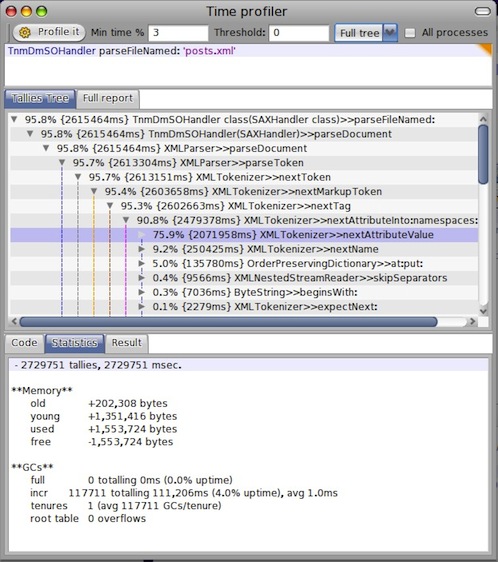StackOverflow SQLite Full Text Search
In the previous entry, I wrote about parsing the StackOverflow XML dump files.
This entry is about setting up SQLite full text search for the StackOverflow posts data. In Smalltalk, set up the database schema:
| schema db |
schema := 'create table posts (Id integer primary key, ...)'.
db := SQLiteConnection fileNamed: 'so.db'.
db open.
db executeQuery: schema.
db close.
The key SAX parsing callback method becomes, in essence, as follows:
startElement: aQualifiedName attributes: aDict
| stmt |
"db is the instance variable with the database connection."
stmt := db prepare: 'insert into posts values (?,...,?)'.
aQualifiedName = 'row' ifTrue: [
stmt at: 1 putInteger: (aDict at: 'Id') asInteger.
...
stmt at: 20 putInteger: (aDict at: 'FavoriteCount' ifAbsent: [-1]) asInteger.
stmt step. stmt clearBindings. stmt reset ].
stmt finalize.
On my computer, running through the 6+ million posts took about an hour. The resultant SQLite database file is about 6.5GB in size. Here are the comparative file sizes:
-rw-r--r-- 1 pierce staff 7569879502 Sep 7 2011 posts.xml
-rw-r--r-- 1 pierce staff 6819280896 Nov 24 20:31 so.db
Next, let's set up full text search on this database:
% sqlite3 so.db
sqlite> create virtual table sposts using fts4 (id, body, title);
sqlite> insert into sposts select id, body, title from posts;
sqlite> create virtual table stags using fts4 (id, tags);
sqlite> insert into stags select id, tags from posts;
sqlite>
I didn't time how long the INSERTs took. Setting up full text search boosted the database's file size:
-rw-r--r-- 1 pierce staff 6819280896 Nov 24 20:31 so.db (before FTS)
-rw-r--r-- 1 pierce staff 16491300864 Nov 25 21:34 so.db (after FTS)
Now search the database using the sqlite3 shell tool:
% sqlite3 so.db
sqlite> select count(*) from stags where tags match 'smalltalk';
332
sqlite> select max(id) from stags where tags match 'smalltalk';
7260027
sqlite> select body, tags from posts where id = 7260027;
<p>what's the best server side programming language for web development
if we keep very good performance and a lot of database interaction of
the script with server in mind. i am already working on a project with
php, i'm fearing that my application might have a lot of traffic, i
just want to use only the server side language which is best in terms
of performance, and please also guide me any major step i should take
to prevent my application from crashing when it will face a huge
traffic, what major step i might need to take to stop myself crying
after launching my applicaition, i heard that twitter use ruby, how's
ruby's performance? my concern is only and only performance and
database interaction, thanks in advance.</p>
|<php><python><ruby-on-rails><ruby><smalltalk>
sqlite>
Parsing StackOverflow Data Dump
Periodically, the Stack Exchange people publish a dump of the content of all public Stack Exchange sites. I played with it back in 2009 when this started, but have lost what little code I wrote back then.
I just downloaded the Sep 2011 dump. For StackOverflow alone, here are the file sizes:
total 43273296
-rw-r--r-- 1 pierce staff 170594039 Sep 7 2011 badges.xml
-rw-r--r-- 1 pierce staff 1916999879 Sep 7 2011 comments.xml
-rw-r--r-- 1 pierce staff 1786 Jun 13 2011 license.txt
-rw-r--r-- 1 pierce staff 10958639384 Sep 7 2011 posthistory.xml
-rw-r--r-- 1 pierce staff 7569879502 Sep 7 2011 posts.xml
-rw-r--r-- 1 pierce staff 4780 Sep 7 2011 readme.txt
-rw-r--r-- 1 pierce staff 193250161 Sep 7 2011 users.xml
-rw-r--r-- 1 pierce staff 1346527241 Sep 7 2011 votes.xml
Assuming each row is a line by itself, there were more than six million posts as of Sep 2011:
% egrep "row Id" posts.xml | wc -l
6479788
According to readme.txt in the dump package, the file posts.xml has the following schema:
- posts.xml
- Id
- PostTypeId
- 1: Question
- 2: Answer
- ParentID (only present if PostTypeId is 2)
- AcceptedAnswerId (only present if PostTypeId is 1)
- CreationDate
- Score
- ViewCount
- Body
- OwnerUserId
- LastEditorUserId
- LastEditorDisplayName="Jeff Atwood"
- LastEditDate="2009-03-05T22:28:34.823"
- LastActivityDate="2009-03-11T12:51:01.480"
- CommunityOwnedDate="2009-03-11T12:51:01.480"
- ClosedDate="2009-03-11T12:51:01.480"
- Title=
- Tags=
- AnswerCount
- CommentCount
- FavoriteCount
I'm not going to build a DOM tree of 6+ millions posts in RAM yet, so I'll use a SAX handler to parse the thing. First, install XMLSupport:
Gofer new
squeaksource: 'XMLSupport';
package: 'ConfigurationOfXMLSupport';
load.
(Smalltalk at: #ConfigurationOfXMLSupport) perform: #loadDefault.
As per SAXHandler's class comment, subclass it and override handlers under the "content" and "lexical" categories as needed:
SAXHandler subclass: #TnmDmSOHandler
instanceVariableNames: ''
classVariableNames: ''
poolDictionaries: ''
category: 'TNM-DataMining-StackOverflow'
For a schema as simple as the above, the method of interest is this:
startElement: aQualifiedName attributes: aDictionary
aQualifiedName = 'row' ifTrue: [ Transcript show: aDictionary keys; cr ]
Using a 1-row test set, the following do-it
TnmDmSOHandler parseFileNamed: 'p.xml'
produces this output:
#('Id' 'PostTypeId' 'AcceptedAnswerId' 'CreationDate' 'Score'
'ViewCount' 'Body' 'OwnerUserId' 'LastEditorUserId'
'LastEditorDisplayName' 'LastEditDate' 'LastActivityDate' 'Title'
'Tags' 'AnswerCount' 'CommentCount' 'FavoriteCount')
From here on, it is straightforward to fleshen startElement:attributes: to extract the stuff that is interesting to me.
To count the actual number of records, just keep a running count as each post is parsed, and print that number in the method endDocument. The run took a long time (by the wall clock) and counted 6,479,788 posts, the same number as produced by egrep'ping rowId.
How about Smalltalk time? Let's ask TimeProfiler.
TimeProfiler onBlock: [ TnmDmSOHandler parseFileNamed: 'posts.xml' ]

Btw, saw this comment on HN: "If it fits on an iPod, it's not big data." :-)
Tags: parsing, StackOverflow, XML